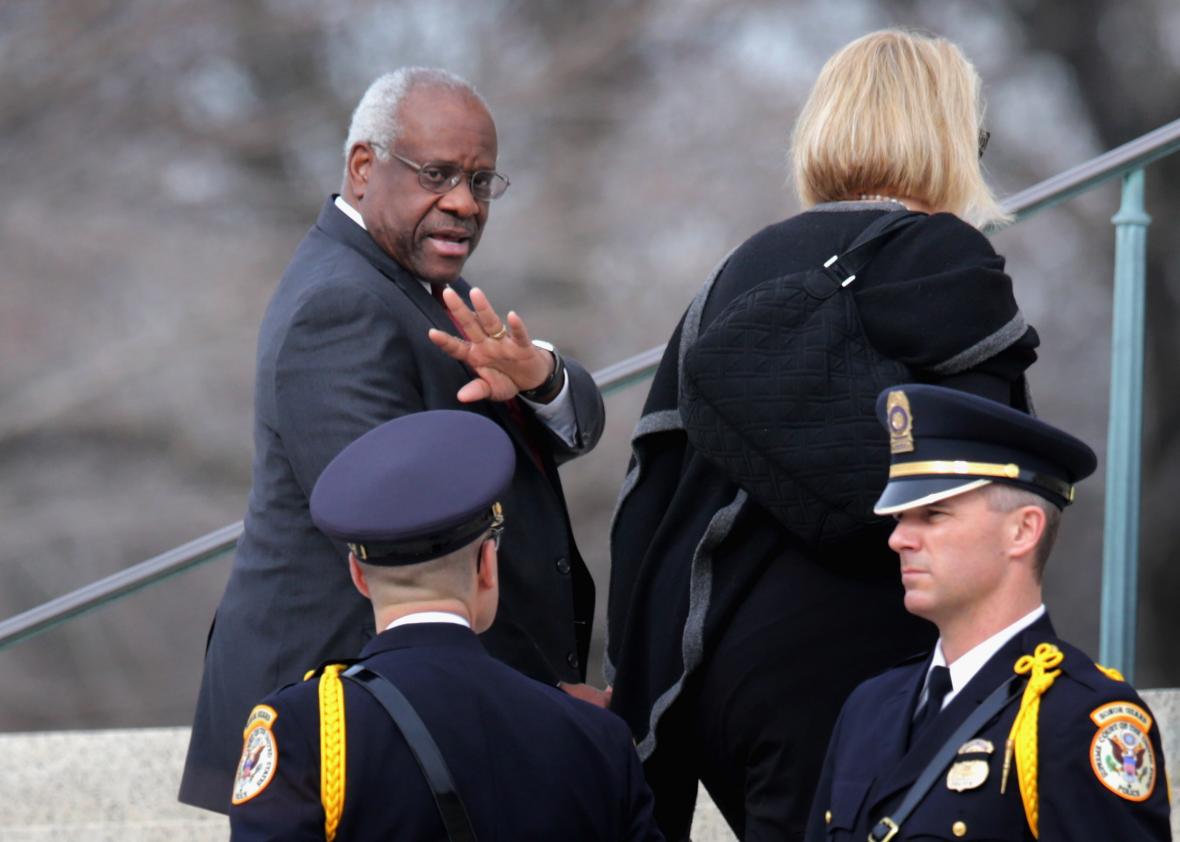For 10 years, Justice Clarence Thomas has sat on the bench of the Supreme Court through innumerable oral arguments without asking a single question. That all changed today.
On Monday morning, the Supreme Court heard oral arguments in Voisine v. United States, a complex and arcane case involving domestic violence and gun ownership. The case initially seemed to revolve around a technical question of criminal intent. Stephen Voisine was convicted of “intentionally, knowingly, or recklessly caus[ing] bodily injury or offensive physical contact” to his girlfriend following a domestic dispute. As a result, he was stripped of his ability to own a gun, because United States federal law indefinitely bars individuals convicted of “a misdemeanor crime of domestic violence” from owning firearms. Voisine now argues that “recklessly” causing violence—as opposed to knowingly or intentionally—shouldn’t disqualify him from possessing a gun under federal law.
Arguments were somewhat dry until the last few minutes, when Ilana H. Eisenstein, an assistant to the solicitor general representing the federal government, was preparing to finish up and take her seat. Just before she left the lectern, Justice Clarence Thomas spoke up, asking his very first question from the bench in a decade. The entire court perked up. Everyone shifted forward in their seats, and there was a look of shock on many spectators’ faces. We in the press section nearly fell out of our seats, though the other justices kept admirably cool, with only Chief Justice John Roberts swiveling his head in evident surprise.
Thomas noted that a conviction under the federal statute in question “suspends a constitutional right”—the right of individuals to own guns, as established in 2008’s decision, District of Columbia v. Heller. The government argues, Thomas explained, that “recklessness” in using physical force against an intimate partner is “sufficient to trigger a misdemeanor violation that results in the suspension of what is at least as of now still a constitutional right.” (Thomas appeared to be extremely aware that Heller was a 5–4 decision, authored by Justice Antonin Scalia, which could be on the chopping block if the balance of the court shifts to the left.)
The justice, speaking calmly but forcefully, then pointed out that under the federal law, a domestic abuser doesn’t actually have to use a gun against his partner to lose his gun rights. He need only commit some form of domestic abuse, with a firearm or without it. Thomas struck a tone of puzzlement with a tinge of irritation. “Therefore,” he said, “a constitutional right is suspended—even if [the domestic violence] is unrelated to the possession of a gun?”
Eisenstein retorted that individuals who have previously battered spouses have an exponentially higher risk of injuring their spouse with a firearm in the future. But Thomas dug in, asking whether any other law indefinitely suspended an individual’s constitutional rights for recklessly committing a crime. What if “a publisher is reckless about the use of children in what could be indecent displays?” he asked. Could the government “suspend this publisher’s right to ever publish again?” Is suspending First Amendment rights substantively different from suspending Second Amendment rights?
At that point, Justices Anthony Kennedy and Stephen Breyer jumped in to help Eisenstein. (Kennedy joined Heller but isn’t a Second Amendment absolutist like Thomas; Breyer dissented from Heller.) Kennedy mentioned laws that indefinitely regulate sex offenders’ liberty, though it was a weak example, because those laws do not suspend any fundamental rights absolutely and indefinitely. Breyer veered away from Thomas’ question, noting that Voisine wasn’t directly arguing that the federal law violated his Second Amendment rights. (He had argued that earlier, actually, but the Supreme Court refused to consider that question when it agreed to hear the case.) Instead, Voisine pushed the doctrine of “constitutional avoidance”—essentially arguing that the federal law might infringe upon his right to bear arms, and so the court should rule for him on other grounds to avoid having to decide that vastly more monumental question.
Thomas’ line of questioning completely reversed the court’s apparent view of the case. Before he spoke up, Voisine seemed likely to lose, as a majority of the justices poked holes in his complicated argument over recklessness. After Thomas’ questions, at least one liberal—Breyer—appeared somewhat enticed by the proposition that the court could rule in Voisine’s favor to avoid opening the Pandora’s box that is the Second Amendment. It was a powerful, startling moment, made all the more fascinating by the mystery of Thomas’ motivation: Why now? Is the justice representing the position he knew Scalia would fiercely defend? Is he simply tired of remaining a bystander during arguments before his own court? Either way, the exchange provided a reminder that Thomas’ reticence over the past decade has prevented us from getting a deeper glimpse into his idiosyncratic passions. With any luck, he’ll keep talking.
